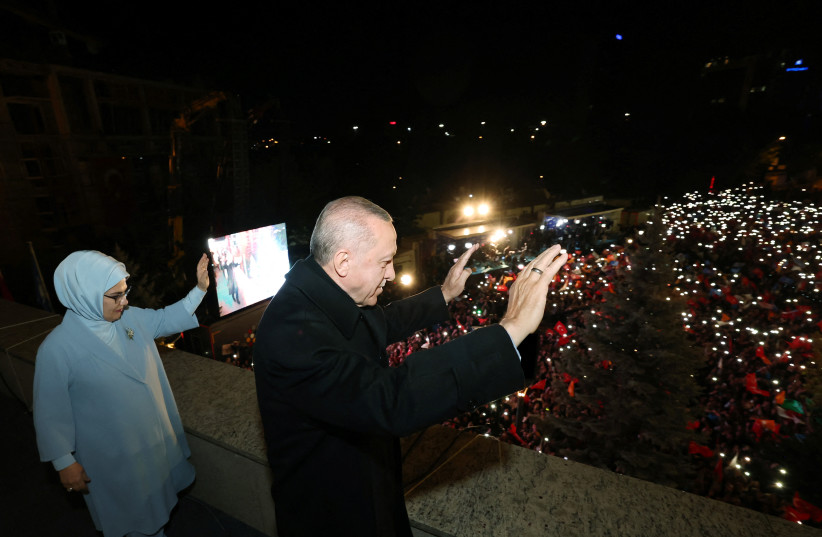Turkish opposition leader Kemal Kilicdaroglu told supporters on Wednesday that the influx of refugees threatens their survival as he rallies support ahead of a second-round presidential election on May 28.
For more stories from The Media Line go to themedialine.org
“We will not abandon our homeland to those incapable of protecting our honor, who stand by as this disorderly tide of people floods into our nation daily,” Kilicdaroglu stated in a video posted on Twitter.
He insinuated that Turkish President Recep Tayyip Erdogan is under the influence of Russia, a country with which he has significantly strengthened ties in recent years and upon which Turkey heavily relies for its energy needs.
Erdogan leads in presidential election
In the first round of the presidential election on Sunday, Erdogan secured a substantial lead with approximately 49.5% of the votes, compared to Kilicdaroglu's 44.9%, to the opposition’s surprise.
A candidate must receive 50% plus one vote to become the president of Turkey.

Contrary to expectations, most polls suggested a tighter race, with some even showing Kilicdaroglu in the lead. However, analysts cautioned that polling has a mixed record in Turkey, leading some to speculate about the existence of “shy conservatives” who were reluctant to express their support for Erdogan.
Kilicdaroglu is part of the Alevi minority that practices a more liberal version of Islam than Sunnis, who are the majority in Turkey.
Soner Cagaptay, a senior fellow focusing on Turkey at the Washington Institute, told The Media Line that while Kilicdaroglu performed well among urban centrists, he fell short in middle-income provinces and rural areas. There was also a lack of support from the CHP’s coalition partners or parties that pledged to back Kilicdaroglu.
Cagaptay noted that the pro-Kurdish HDP’s support was less robust, with some of their supporters seemingly abstaining from voting. He also mentioned that areas that typically would have supported one of the CHP’s alliance partners, the nationalist Good Party (IYI), partly shifted to far-right presidential candidate Sinan Ogan, the only other challenger to Erdogan, rather than Kilicdaroglu.
“For central Turkey, it was the Turkish nationalist voters who abandoned him,” said Cagaptay.
Erdogan linked Kilicdaroglu to the PKK
He speculated that some nationalist voters were swayed by Erdogan's repeated allegations linking Kilicdaroglu to the PKK, a Kurdish militia labeled as a terrorist organization by Turkey and the US. This claim might have been reinforced by an attack from ultra-nationalists against a rally held by Kilicdaroglu's ally, Istanbul mayor Ekrem Imamoglu, in a town that has consistently supported Erdogan in elections.
Cagaptay suggested that the lack of prosecution for the alleged attackers and the absence of full condemnation from the government may have persuaded voters of a possible connection between Kilicdaroglu and the PKK.
“That probably deterred some voters,” Cagaptay said. “I actually believe that the attack was a turning point in the campaign.”
Ömer Özkizilcik, a foreign policy and security analyst based in Ankara, opined that Erdogan would not make any strategic changes, choosing instead to continue with his existing policies and rhetoric.
He argued that most voters who supported far-right candidate Sinan Ogan would likely support Erdogan, as they are located in the Turkish president’s strongholds.
Erdogan lost former supporters
“However, Erdogan has already begun to caution his supporters against complacency. Absent a game-changing event, Erdogan is likely to win by a landslide,” Özkizilcik wrote in a message to The Media Line.
Özkizilcik noted that Erdogan had underperformed in Istanbul and among Kurdish voters, suffering losses in the southeast, where the minority group is most dominant.
“Erdogan has lost many supporters in Turkey’s economic heartland, where his political career started,” Özkizilcik stated.
The most significant political setback for the Turkish president was the 2019 Istanbul mayoral election. The CHP seized control after Erdogan’s party and its predecessor had held power for more than two decades.
Erdogan campaigned vigorously for his party’s candidate, his former prime minister. However, after the CHP won the initial election, the electoral board nullified the results and ordered a rerun, which was again won by the opposition party.
This loss was largely attributed to the country’s faltering economy, which was also predicted to contribute to Erdogan's expected underperformance.
